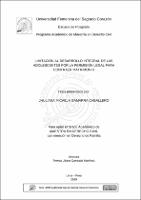Limitación al desarrollo integral de las adolescentes por la permisión legal para contraer matrimonio
Abstract
Esta investigación examina la limitación al desarrollo de las adolescentes casadas en Perú. El estudio tiene como objetivo determinar si la permisión legal para que las adolescentes contraigan matrimonio y la equiparidad normativa en el cumplimiento de deberes y obligaciones genera restricción a su derecho a la educación, y si el embarazo precoz constituye riesgo de mortalidad. Analizado el contenido del Sistema de Registro del Certificado de Nacido Vivo del Ministerio de Salud respecto a las adolescentes casadas y con hijos de 16 a 18 años de edad, revela que en Perú el 81.37% de las adolescentes casadas son madres y que el matrimonio es una razón de mayor incidencia para la deserción escolar. Asimismo, se ha identificado en Lima Sur que 104 adolescentes casadas se encuentran embarazadas y que el nivel educativo más alto alcanzado es secundaria completa, seguido del porcentaje de adolescentes que no la han concluido, además de los riesgos de mortalidad para éstas y sus futuros hijos producto de su falta de desarrollo físico. La investigación se sustenta en la teoría mixta del matrimonio y la teoría de la psicología del desarrollo de la infancia a la adolescencia, sustento teórico que determina que los adolescentes son sujetos en desarrollo cuyos derechos como la educación, la integridad y la vida se limitan cuando contraen matrimonio, por ende desarrollar la tesis nos permitió construir criterios que sustentan la derogación del artículo 241° inciso 1 del Código Civil. This investigation looks for the teenager´s limitations of progress when they get married in Peru. This study has the objective to state if the legal permission for teenagers to get married and equality in law when they have commitments and obligations generates restrictions on their right to education, as the same as the early pregnancy with mortality. Analyzing the contents of the Newborn Certificate Register System of the Ministry of Health, the information reveals that in Peru the 81.37% of married teenagers between 16 and 18 years old that have children, are school dropouts, and marriage is the first cause of it. Therefore, 104 teenagers that live in the South of Lima that got married are pregnant and their highest level of educations is the 5th year of secondary school. After them, comes a percentage of adolescents that haven’t completed their secondary education with mortality risks for them and their future children, adding the lack of physical development of all of these teenagers. This investigation states the mixed theory of marriage and Children’s and adolescents´ psychology theory of development, theoretical frame that helps us to state that teenagers are individuals in development with important rights as education, integrity and life that are limited when they get married. The progress of this thesis has allowed us to build foundations to abolish the 241° article item 1 in the Civil Code.
Description
Tesis


